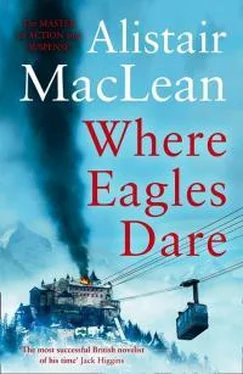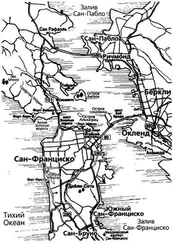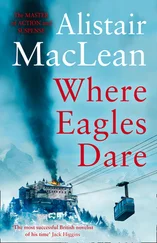Schaffer had the headlights switched on main beam, illuminating the runway, and the post-bus engine running as the black squat shape of the Mosquito, air-brakes fully extended, lined up for its approach to the runway, and had the bus itself moving, accelerating quickly through the gears, as the Mosquito sank down over the top of the bus and settled down beautifully without the slightest suspicion of a bounce.
Within a minute Schaffer brought the bus to a skidding halt only yards from the now stationary plane. Half a minute later, with all five of them safely inside the plane, Carpenter had the Mosquito turned through 180° and was standing hard on the brakes as he brought the engines up to maximum revolutions. And then they were on their way, gathering speed so rapidly that they were air-borne two hundred yards before the end of the runway. For the first mile of their climb Carpenter kept the plane heading almost directly towards the blazing castle that now redly illuminated the entire valley, then the funeral pyre of the Schloss Adler vanished for the last time as the Mosquito banked and headed for the north-west and home.
Wing Commander Carpenter took the Mosquito up to five thousand feet and kept it there. The time for dodging around among the bushes was past for, on the outward journey, Carpenter had been concerned only that no German station pick him up long enough to form even a rough guess as to where he was going. But now he didn’t care if every radar station in the country knew where he was going: he was going home to England, mission accomplished, and there wasn’t a warplane in Europe that could catch him. Wing Commander Carpenter pulled luxuriously at his evil-smelling briar. He was well content.
His five newly-acquired passengers were, perhaps, a fraction less content. They lacked Carpenter’s well-upholstered pilot’s seat. The interior of the Mosquito made no concessions whatsoever to passenger comfort. It was bleak, icy, cramped – it didn’t require much space to carry a 4,000 lb bomb load, the Mosquito’s maximum – and totally devoid of seating in any form. The three men and the two girls squatted uncomfortably on thin palliasses, the expressions on their faces pretty accurately reflecting their acute discomfort. Colonel Wyatt-Turner, still holding across his knees the Sten gun he’d had at the ready in case any trouble had developed on the ground or the flashing lights of the truck had been a German ruse, was sitting sideways in the co-pilot’s seat so that he could see and talk to the pilot and the passengers at the same time. He had accepted without question or apparent interest Smith’s brief explanation of the two girls’ presence as being necessary to escape Gestapo vengeance. Colonel Wyatt-Turner had other and weightier matters on his mind.
Smith looked up from the bleeding mangled hand that Mary was re-bandaging with the plane’s first aid kit and said to the Colonel: ‘It was good of you to come in person to meet us, sir.’
‘It wasn’t good of me at all,’ Wyatt-Turner said frankly. ‘I’d have gone mad if I’d stayed another minute in London – I had to know. It was I who sent you all out here.’ He sat without speaking for some time, then went on heavily: ‘Torrance-Smythe gone, Sergeant Harrod, and now, you say, Carraciola, Christiansen and Thomas. All dead. A heavy price, Smith, a terrible price. My best men.’
‘All of them, sir?’ Smith asked softly.
‘I’m getting old.’ Wyatt-Turner shook his head wearily and drew a hand across his eyes. ‘Did you find out who–’
‘Carraciola.’
‘Carraciola! Ted Carraciola? Never! I can’t believe it.’
‘ And Christiansen.’ Smith’s voice was still quiet, still even. ‘ And Thomas.’
‘And Christiansen? And Thomas?’ He looked consideringly at Smith. ‘You’ve been through a lot, Major Smith. You’re not well.’
‘I’m not as well as I was,’ Smith admitted. ‘But I was well enough when I killed them.’
‘You – you killed them?’
‘I’ve killed a traitor before now. You know that.’
‘But – but traitors! All three of them. Impossible. I can’t believe it! I won’t believe it!’
‘Then maybe you’ll believe this, sir.’ Smith produced one of the note-books from his tunic and handed it to Wyatt-Turner. ‘The names and addresses or contacts of every German agent in southern England and the names of all British agents in north-west Europe who have been supplanted by German agents. You will recognize Carraciola’s writing. He wrote this under duress.’
Slowly, like a man in a dream, Wyatt-Turner reached out and took the note-book. For three minutes he examined the contents, leafing slowly, almost reluctantly through the pages, then finally laid the book down with a sigh.
‘This is the most important document in Europe, the most important document I have ever seen.’ Wyatt-Turner sighed. ‘The nation is deeply in your debt, Major Smith.’
‘Thank you, sir.’
‘Or would have been. It’s a great pity it will never have the chance to express its gratitude.’ He lifted the Sten from his knees and pointed it at Smith’s heart. ‘You will do nothing foolish, will you, Major Smith?’
‘What in God’s name–’ Carpenter twisted in his seat and stared at Wyatt-Turner in startled and total disbelief.
‘Concentrate on your flying, my dear Wing Commander.’ Wyatt-Turner waved the Sten gently in Carpenter’s direction. ‘Your course will do for the present. We’ll be landing at Lille airport within the hour.’
‘The guy’s gone nuts!’ Schaffer’s voice was a shocked whisper.
‘If he has,’ Smith said dryly, ‘he went nuts some years ago. Ladies and gentlemen, I give you the most dangerous spy in Europe, the most successful double agent of all time.’ He paused for reaction, but the silence remained unbroken: the enormity of the revelation of Wyatt-Turner’s duplicity was too great for immediate comprehension. Smith continued: ‘Colonel Wyatt-Turner, you will be court-martialled this afternoon, sentenced, removed to the Tower then taken out, blindfolded and shot at eight o’clock tomorrow morning.’
‘You knew?’ Wyatt-Turner’s affable self-confidence had completely deserted him and his voice, low and strained, was barely distinguishable above the clamour of the engines. ‘You knew about me?’
‘I knew about you,’ Smith nodded. ‘But we all knew about you, didn’t we, Colonel? Three years, you claimed, behind the German lines, served with the Wehrmacht and finally penetrated the Berlin High Command. Sure you did. With the help of the Wehrmacht and the High Command. But when the tide of war turned and you could no longer feed the Allies with false and misleading reports about proposed German advances, then you were allowed to escape back to England to feed the Germans true and accurate reports about Allied plans – and give them all the information they required to round up British agents in north-west Europe. How many million francs do you have in your numbered account in Zurich, Colonel?’
Wing Commander Carpenter stared straight ahead through the windscreen and said very slowly: ‘Frankly, old chap, this is preposterous.’
‘Try batting an eyelid and see just how preposterous that Sten gun is,’ Smith suggested. He looked at Wyatt-Turner again. ‘You underestimated Admiral Rolland, I’m afraid. He’s had his suspicions about you and the four section leaders of Department C for months. But he was wrong about Torrance-Smythe.’
‘Guess away.’ Wyatt-Turner had recovered his composure and most of his self-confidence. ‘It’ll pass the time till we get to Lille.’
‘Unfortunately for you, there is no guess-work. Admiral Rolland recalled me – and Mary – from Italy: he could no longer be sure of anyone in London. You know how corruption spreads? Played it very clever, did the Admiral. He told you he had his suspicions about one of his section leaders, but didn’t know which. So, when General Carnaby crashed, he put up to you the idea of sending the section officers to the rescue – and made damn sure that you never once had the opportunity of talking to any of them in private before they took off.’
Читать дальше
Конец ознакомительного отрывка
Купить книгу










